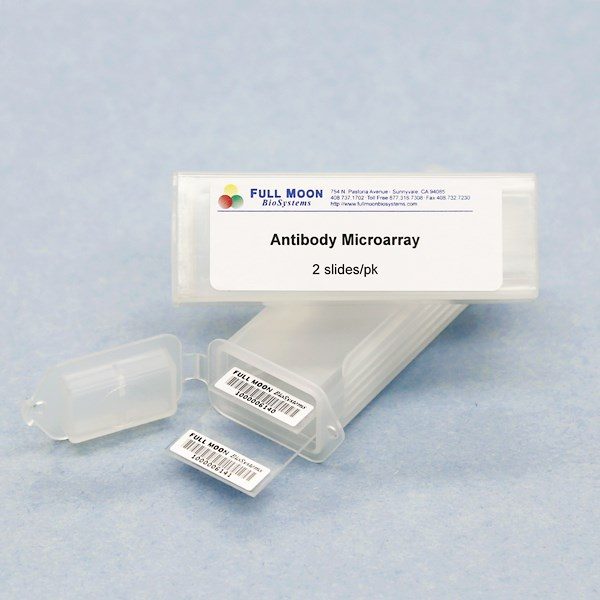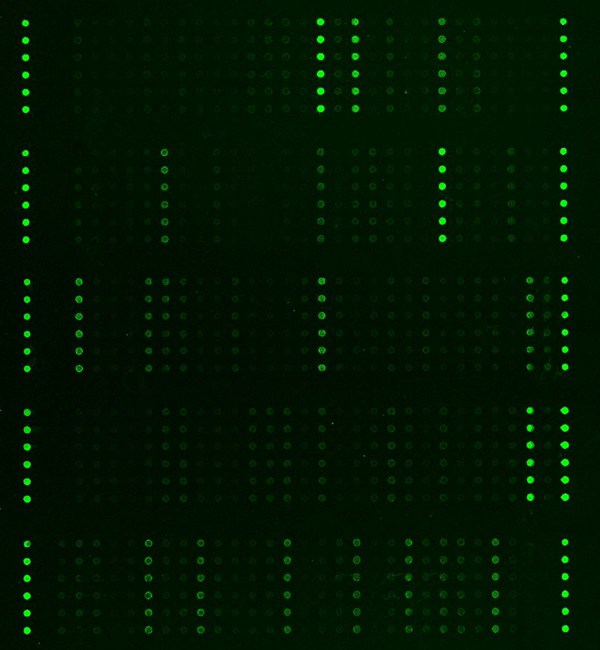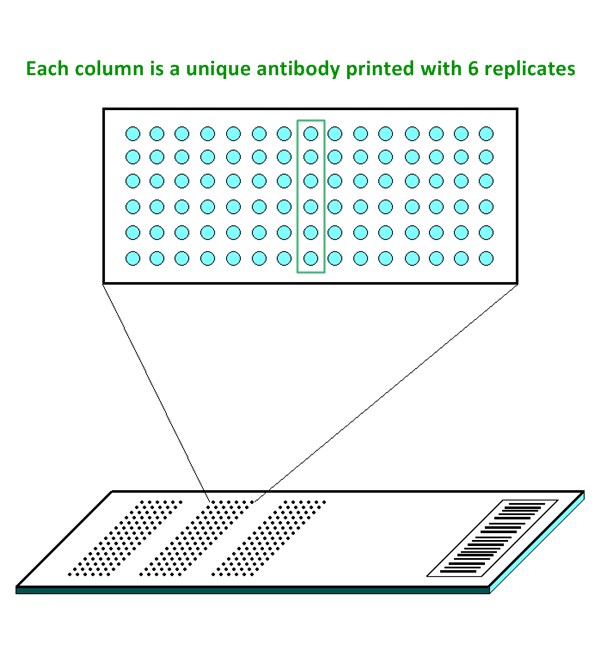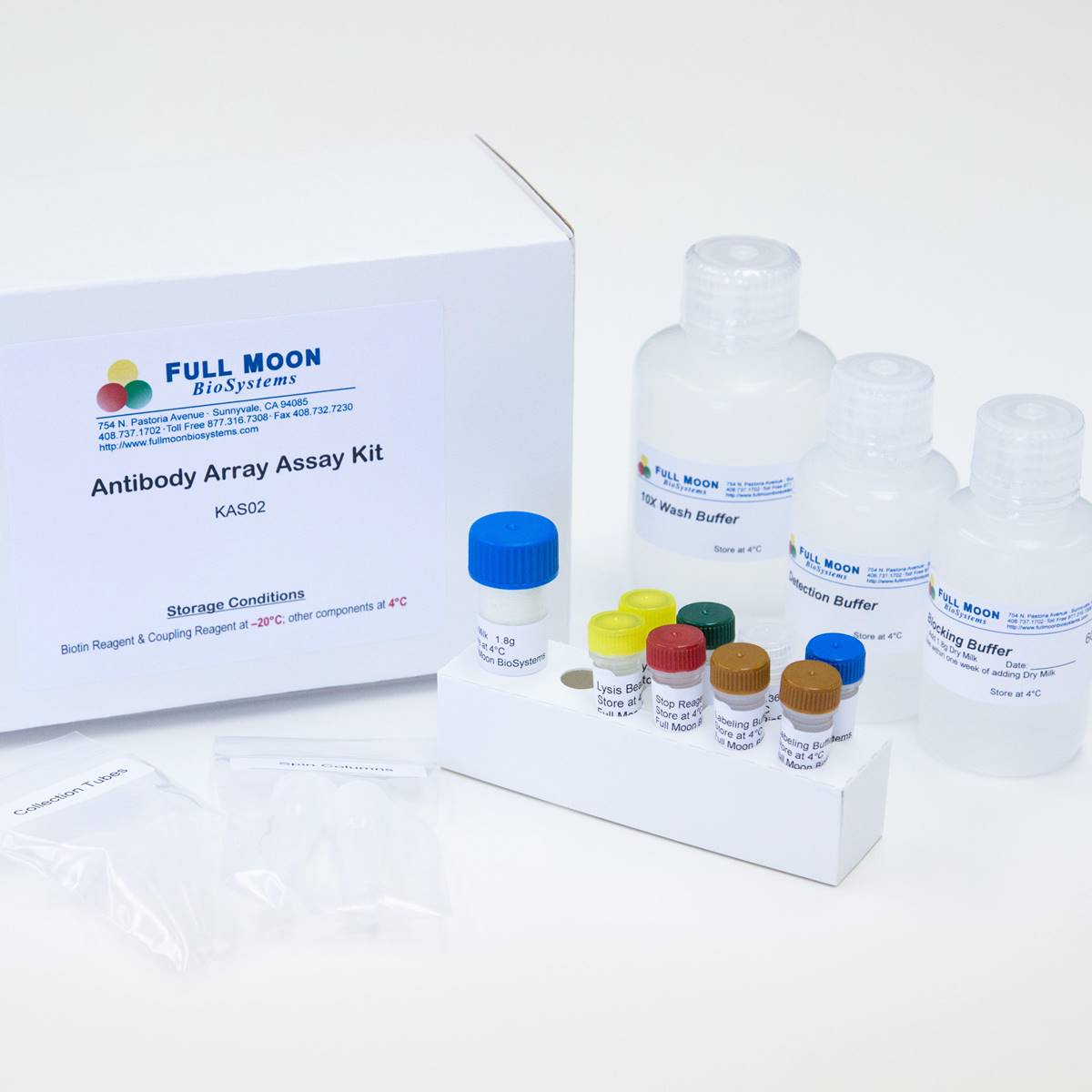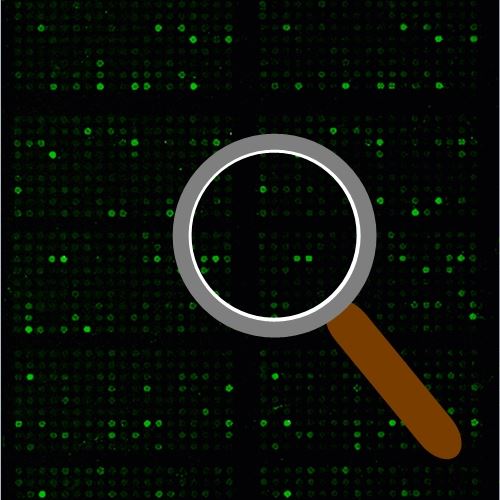MAPK Pathway Phospho Antibody Array
MAPK Pathway Phospho Antibody Array is a high-throughput ELISA based antibody array for qualitative protein phosphorylation profiling. It is suitable for comparing normal samples to treated or diseased samples, and identifying candidate biomarkers. This array features site-specific and phospho-specific antibodies, allowing researchers to study tyrosine phosphorylation and serine/threonine phosphorylation at specific sites.
Key Features
- Site-specific phosphorylation profiling and screening with 185 antibodies
- Antibodies covalently immobilized on 3D polymer coated glass slide
- Fluorescent detection
Specifications
| Product Size: | 2 array slides per package for analyzing two samples (untreated vs. treated) |
| Featured Antibodies: | 185 site-specific and phospho-specific antibodies; 6 replicates per antibody |
| Reactivity: | Human: 100% | Mouse: 85% Rat: 71% |
| Suitable Sample Type: | Cell lysate | Tissue lysate |
| Detection Method: | Fluorescence | Compatible Scanners |
| Internal Controls: | Positive controls: beta-actin | GAPDH | Negative controls |
| Slide dimensions: | 76 x 25 x 1 mm |
| Storage Condition: | 4°C for 6 months |
PRODUCT DETAILS
4E-BP1(Thr36), 4E-BP1(Thr45), ASK1(Ser83), ASK1(Ser966), ATF2(Ser112 or 94), ATF2(Ser62 or 44), ATF2(Thr69 or 51), ATF2(Thr71 or 53), ATF2(Thr73 or 55), ATF4(Ser245), c-Jun(Ser243), c-Jun(Ser63), c-Jun(Ser73), c-Jun(Thr239), c-Jun(Thr91), c-Jun(Thr93), c-Jun(Tyr170), c-Kit(Tyr721), CREB(Ser129), CREB(Ser133), eIF2 alpha(Ser51), elF4E(Ser209), Elk1(Ser383), Elk1(Ser389), Elk1(Thr417), Estrogen Receptor-alpha (Ser104), Estrogen Receptor-alpha (Ser106), Estrogen Receptor-alpha (Ser118), Estrogen Receptor-alpha (Ser167), FAK(Tyr861), FAK(Tyr925), Histone H2A.X(Ser139), Histone H3.1(Ser10), HSF1(Ser303), HSP27(Ser15), HSP27(Ser78), HSP27(Ser82), IRS-1(Ser307), IRS-1(Ser312), IRS-1(Ser636), IRS-1(Ser639), JunB(Ser259), JunB(Ser79), JunD(Ser255), MEF2A(Thr312), MEF2A(Thr319), MEK1(Ser217), MEK1(Ser221), MEK1(Thr291), MEK2(Thr394), Met(Tyr1234), Met(Tyr1349), MKK3(Ser189), Myc(Ser373), Myc(Thr358), Myc(Thr58), P38 MAPK(Thr180), P38 MAPK(Tyr182), p44/42 MAP Kinase?Phospho-Thr202), p44/42 MAP Kinase(Tyr204), p53(Ser15), p53(Ser315), p53(Ser33), p53(Ser37), p53(Ser46), p53(Ser6), p53(Ser9), p53(Thr18), PKC delta(Ser645), PKC theta(Ser676), Pyk2(Tyr402), Raf1(Ser259), Raf1(Ser338), SAPK/JNK(Thr183), SAPK/JNK(Tyr185), SEK1/MKK4(Ser80), SEK1/MKK4(Thr261), Src(Tyr418), Src(Tyr529), Stathmin 1(Ser15), Stathmin 1(Ser24), Stathmin 1(Ser37), Tau(Ser214), Tau(Ser235), Tau(Ser262), Tau(Ser356), Tau(Ser396), Tau(Ser404), Tau(Ser422), Tau(Thr181), Tau(Thr205), Tau(Thr212), Tau(Thr231)
The ELISA based MAPK Pathway Phospho Antibody Array platform involves four major steps:
- Protein extraction with non-denaturing lysis buffer
- Biotinylation of protein samples
- Incubation of labeled samples with antibody array
- Detection by dye conjugated streptavidin
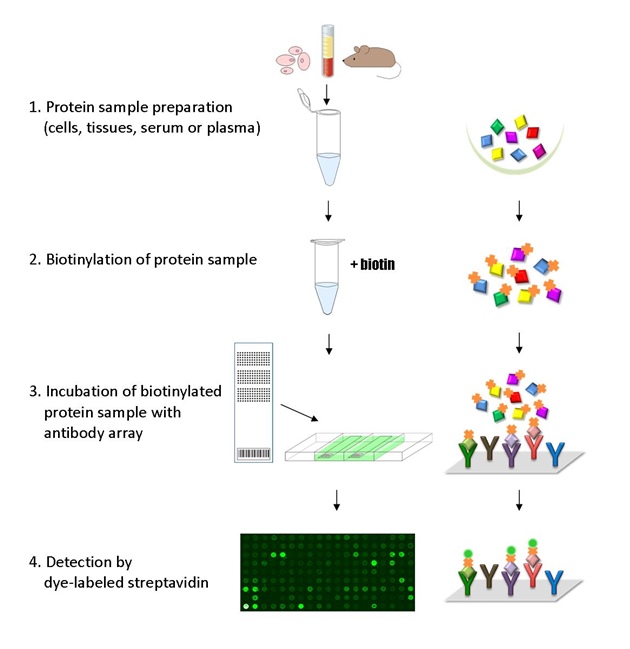
![]() GAL File (To download, right click on the file name, then choose “Save target as”)
GAL File (To download, right click on the file name, then choose “Save target as”)
Feng Y, He F, The Role of GOLPH3L in the Prognosis and NACT response in Cervical Cancer, J Cancer 2017; 8(3):443-454
Genebai N, Ahmad S, Genetic inhibition of JNK3 ameliorates spinal muscular atrophy, Hum Mol Genet, 2015 Sep 30. pii:ddv401
Rao W, Li H, OVA66 Increases Cell Growth, Invasion, and Survival via Regulation of IGF-1R-MAPK Signaling in Human Cancer Cells, Carcinogenesis, 2014 35(7):1573-81
Jin L, Li D, p90 RSK2 Mediates Antianoikis Signals by both Transcription-Dependent and -Independent Mechanisms, Mol Cell Biol, 2013 33(13):2574-85
Kang S, Elf S, p90 ribosomal S6 kinase 2 promotes invasion and metastasis of human head and neck squamous cell carcinoma cells, J Clin Invest. 2010 Apr 1; 120(4): 1165–1177
Kiso-Farne K, Tsuruyama T, Epidermal growth factor receptor cascade prioritizes the maximization of signal transduction, Sci Rep. 2022 Oct 10;12(1):16950
Tsuruyama T, Kullback–Leibler Divergence of an Open-Queuing Network of a Cell-Signal-Transduction Cascade, Entropy 2023, 25(2):326; https://doi.org/10.3390/e25020326
Yu Y, Richardson DR, Cellular iron depletion stimulates the JNK and p38 MAPK signaling transduction pathways, dissociation of ASK1-thioredoxin, and activation of ASK1, J Biol Chem, 2011 286(17):15413-27
Raharijaona M, Le Pennec S, PGC-1-Related Coactivator Modulates Mitochondrial-Nuclear Crosstalk through Endogenous Nitric Oxide in a Cellular Model of Oncocytic Thyroid Tumours, PLoS ONE, 2009 4(11):e7964
ADDITIONAL SERVICES
If you don’t have access to a microarray, send the finished arrays to our lab for scanning. Raw scan images are delivered in tiff format.
Cost: Free
Array Image Quantification and Analysis Service includes data extraction, data organization and analysis of the array images obtained through our array scanning service.
Cost: $200 per slide
Complete Antibody Array Assay Service allows investigators to send research samples to our laboratory for analysis. There is no need to purchase the arrays and reagents and running the assays yourself. Simply select the array of your choice, and then send off the samples to our lab. This convenient hands-off approach offers quick turnaround and reliable results, saving you valuable time and resources. All assays will be performed by our highly trained scientists at our headquarter in Sunnyvale, California. Results are delivered by email in 1-3 weeks.
Cost: $1,470 per sample

